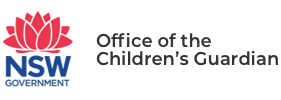Find out how the Office of the Children’s Guardian and the Department of Communities and Justice share information to protect children’s safety, coordinate on agency performance, and reduce duplication in our regulation of out-of-home care and adoption services.
The Office of the Children’s Guardian and the Department of Communities and Justice (DCJ) work together to oversee organisations that provide out-of-home care (OOHC) and adoption services in NSW.
-
The Minister for Families and Communities holds parental responsibility for children in statutory OOHC.
-
DCJ contracts non-government organisations to deliver these services on its behalf and checks that they meet their contractual obligations.
-
The Children’s Guardian accredits these organisations and monitors how well they meet the required Code of Practice.
Under the law, we and DCJ share information to protect children’s safety and wellbeing:
We meet with DCJ every three months to share important updates about the organisations we oversee. Here are some examples of the things we discuss.
-
DCJ tells us about anything that might affect accreditation.
-
We let DCJ know if there are concerns about an organisation meeting the Code of Practice or its progression from provisional to full accreditation.
-
Before granting or renewing accreditation, we consult with DCJ, and then share the agency’s conditions of accreditation, if accreditation is granted.
-
We and DCJ may also share information about individual children if there are concerns about their safety.
Agencies must give information to DCJ as part of their contractual obligations, and to the Office of the Children’s Guardian as the regulator. When our work overlaps, we and DCJ work together and share information to make the process easier for agencies and keep decisions consistent.
Conditions of accreditation, agency action plans and feedback reports
The Children’s Guardian gives each accredited agency a Notice of Conditions of Accreditation, which we publish with the agency’s details on our website.
If we’re concerned that an agency might not be compliant with the Code of Practice, we may impose a condition on an agency’s accreditation requiring them to create an action plan to fix the issues. In that case, we’ll share the plan with DCJ.
If the agency already has an action plan and we impose a condition of accreditation requiring updates on the plan’s progress, we’ll also share that plan with DCJ.
If an agency has given an action plan (sometimes called a performance improvement or service development plan) to DCJ, we may require them to send updates to us too. We work together with the agency and DCJ to avoid unnecessary duplication and reduce the reporting burden.
If an agency has a condition that involves an action plan or updates, we’ll also share any related accreditation or monitoring feedback reports with DCJ until the condition is removed.
We always let the agency know if we share their action plan or feedback reports with DCJ.
